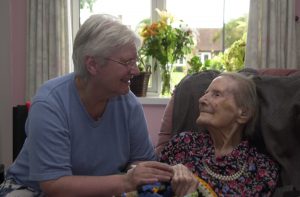 In the same week were two stories with such contrast. They showed completely different ways of valuing life. One is from a daughter who visits her mother in a dementia care home three or four times a week. The moment she goes in and says ‘hello’ to the residents, or smiles at them, they all smile back, shake hands, start talking, or just wave. One lady rarely speaks, but said once, ‘thank you, thank you very much; you’re always smiling at me.’ Another lady just wanted to hug her. They all interact in one way or another. The residents have everything they physically need, but their biggest need is human interaction – someone to listen and speak with, to smile and to hug them. She is sad for residents who have children who come to visit them just once a year – or never.
In the same week were two stories with such contrast. They showed completely different ways of valuing life. One is from a daughter who visits her mother in a dementia care home three or four times a week. The moment she goes in and says ‘hello’ to the residents, or smiles at them, they all smile back, shake hands, start talking, or just wave. One lady rarely speaks, but said once, ‘thank you, thank you very much; you’re always smiling at me.’ Another lady just wanted to hug her. They all interact in one way or another. The residents have everything they physically need, but their biggest need is human interaction – someone to listen and speak with, to smile and to hug them. She is sad for residents who have children who come to visit them just once a year – or never.
She’ll often take her teenage son with her, and at Easter time he brought a friend and they both sang for the residents. This Christmas, they’re organising another singing party. It’s a great opportunity to teach our children how to make someone’s life happier, she said.
The daughter – Viktoriya Valdavius, wrote a letter to a newspaper about it. ‘It’s an opportunity to teach our kids to respect grandparents and old people and to spare some time for a very rewarding mission. We need to make our children aware that we need our parents not only when they’re healthy and strong, but even when they’re frail.’[i]
‘Show your love before it’s too late,’ she urges, ‘When our parents pass away, we can never again be sons and daughters.’
Let me die so my children can have my money
In contrast are the older parents who would rather die than allow care home fees to eat into their children’s inheritance. The number registering power of attorney documents enshrining their wishes has doubled to half a million people in the past two years. A lawyer with one firm said that the picture painted by many clients is a stark one, representing a step change. ‘The most common theme is a desire to refuse prospective treatment should they become incapacitated because they realise how the costs of care could drastically affect the amounts which they can pass on to the families.’ [ii]
The press story only mentions the possibility of refusing medical treatment to extend life, not actively seeking euthanasia, but it raises all kinds of possible scenarios. In what circumstances could adult children intervene and insist the terms of the POA be enacted and their father, or mother, be allowed to die? Why would their parents assume that this is what they would prefer? What’s the value of a life? What message are they sending to their grandchildren?
In his book, ‘Being Mortal’, American surgeon Atal Gawande describes the last days of his father’s illness (his father was also a surgeon.) His mother wanted to cherish every moment with her beloved husband, knowing the end was near. But his father needed pain killing medication that would make him drift in and out of unconsciousness. Atul asked him, ‘If you could sleep through it, is that what you’d prefer?’ His mother asked, ‘You don’t want to be awake, aware of us, with us like this?’ He didn’t speak for a moment, but then said, ‘I don’t want to experience this.’ In a final few moments of awareness, he asked for his grandchildren. They weren’t there, but Atul showed him their photographs, on his i-Pad. ‘His eyes went wide, and his smile was huge. He looked at every picture in detail.’
The most important legacy we leave is not money.
[i] Daily Mail, Thursday December 15, 2016
[ii] The Times, Dec 13, 2016














